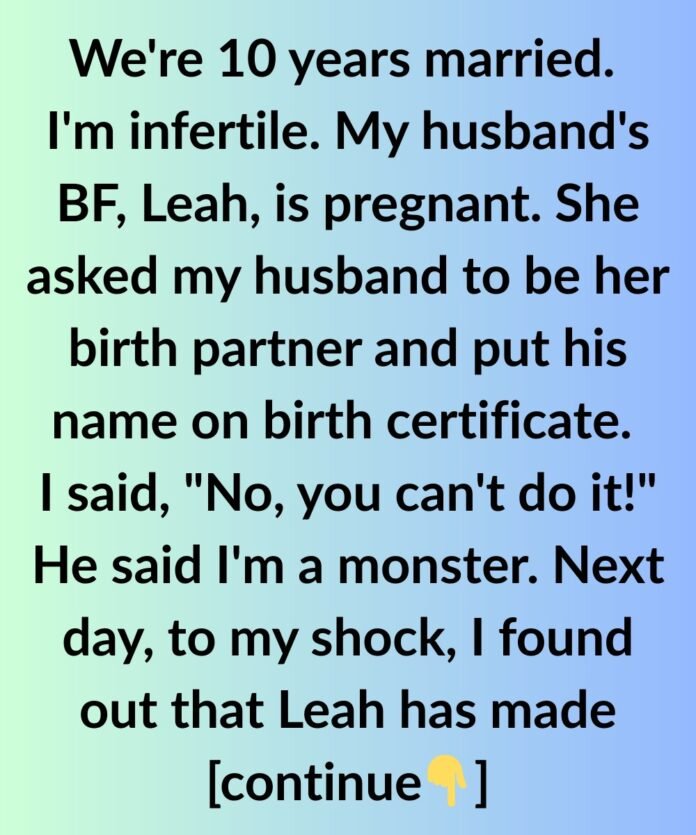Marriage is built on love, loyalty, and trust. For many couples, those vows are tested not just by everyday struggles but by deep heartbreaks, such as infertility and the longing for children. That kind of pain can either bring two people closer or slowly drive a wedge between them.
For one woman, whom we’ll call Jenna, that wedge came in the most shocking way. After ten years of marriage and years of fertility treatments, she thought she and her husband were finally learning how to heal together. Instead, she now finds herself facing a devastating betrayal: her husband has decided he wants to play the role of father… but not to her child. To another woman’s.
This isn’t just about friendship. It’s about loyalty, legal rights, and what happens when blurred boundaries threaten the very foundation of a marriage.
A Marriage Tested by Infertility
Jenna and her husband, Mike, have walked a long road together. For more than seven years, they tried desperately to conceive. Month after month of disappointment turned into years of invasive fertility treatments, endless doctor visits, and waves of grief that never seemed to ease.
At the end of it all came the diagnosis Jenna had feared: she was infertile. It was a crushing blow, but she believed she and her husband had mourned that loss together.
But now, as Jenna shares her story, she realizes she may have been grieving alone.
Enter Leah: The Best Friend in the Background
Every couple has people who drift in and out of their lives, but for Jenna, one woman was always hovering on the edges of her marriage. Her name is Leah, Mike’s childhood best friend.
Jenna tolerated the friendship, even when it made her uneasy. After all, Mike insisted it was innocent. They grew up together, shared memories, and leaned on each other. But Jenna admits she never fully trusted how close they were.
Then came the turning point. Leah, now 34, became pregnant after a brief relationship. When the father walked away, Leah was left alone and facing single motherhood. That’s when she turned to Mike—not just for support, but for something far more complicated.
The Request That Changed Everything
First, Leah asked Mike to be her birth partner, the person standing at her side in the delivery room. Jenna already felt uneasy about that, sensing that her husband was being pulled into an intimate role that should have been reserved for family.
But then came the real shock. Leah asked Mike to go one step further: to put his name on her baby’s birth certificate. Not as a supportive friend. As the father.
Her reasoning? Mike had no children of his own, and this baby would give him the chance to finally be “a dad.” Leah even tried to soften the request by saying she wouldn’t ask him for money, only for his name and presence. To Jenna, it was manipulation dressed as compassion.
A Husband Torn Between Loyalty and Desire
When Jenna confronted Mike, she expected outrage. She expected him to say Leah had crossed a line. Instead, he accused Jenna of being selfish and bitter because she couldn’t give him children.
“He told me this might be his only chance to be a father,” Jenna explains. “He said I was cruel for standing in the way of a baby having a dad.”
For Jenna, those words cut deeper than any infertility diagnosis ever could. She was no longer just battling biology—she was battling her own husband’s shifting loyalty.
The Emotional Manipulation Intensifies
If Mike’s response wasn’t painful enough, Leah soon made things worse. She sent Jenna a tearful voice message, sobbing about how she thought Jenna, of all people, would understand the ache of wanting a child.
Then she dropped a bombshell:
“If you really cared about Mike, you’d let him have this. Just one child. I’m not even asking for money, just his name. If it means that much, I’ll later tell people the baby’s dad passed away.”
For Jenna, this wasn’t compassion. It was guilt-tripping at its worst—using her pain against her to push her into accepting something no spouse should ever have to tolerate.
The Ultimatum
Jenna made her position crystal clear. If her husband signed that birth certificate, their marriage was over. He could move in with Leah and play house permanently.
But Mike didn’t see it that way. He accused Jenna of giving him an ultimatum and forcing him to choose between being “there for a helpless baby” and staying in a marriage with a woman who “resents motherhood.”
That was the cruelest cut of all. Jenna does not resent motherhood. She resents being erased, reduced to a placeholder while her husband volunteers to father another woman’s child.
The Legal and Emotional Consequences
What Mike seems unwilling to face is that signing a birth certificate is not just a symbolic gesture. It is a binding legal decision that could tie him to Leah and her child for life. He could become legally responsible for support, decision-making, and involvement in that child’s upbringing, regardless of whether he ever intended to.
From a family law perspective, this isn’t just friendship—it’s parenthood, with all its rights and obligations. For Jenna, watching her husband sign such a document would be the same as watching him walk away from their marriage entirely.
A Marriage on the Brink
Jenna is left asking herself the question so many spouses in her shoes ask: Am I losing my mind?
She isn’t. She is standing up for her marriage, her dignity, and her future. While compassion for a single mother is admirable, no husband should be expected to step into the role of father for another woman’s child without destroying the trust and foundation of his own marriage.
This isn’t about cruelty. It’s about boundaries. It’s about the difference between helping a friend in need and rewriting the very definition of loyalty.
What Experts Might Say
If Jenna sought marriage counseling, many therapists would likely focus on communication, boundaries, and the deep grief infertility creates in relationships. Couples struggling with infertility often experience distance, resentment, and painful misunderstandings.
But most experts would agree: asking a husband to legally parent another woman’s baby crosses a line that no amount of therapy can easily mend. At that point, the marriage isn’t just strained—it’s being redefined without mutual consent.
From a legal standpoint, family lawyers would warn Mike of the lifelong implications of signing a birth certificate. Even if Leah promised not to ask for financial support, the law would hold him accountable as the child’s legal father.
Moving Forward: Choosing Marriage or Fatherhood Elsewhere
At the heart of Jenna’s story is a choice every spouse dreads: her husband must decide where his loyalty lies. Either he honors his marriage vows, or he steps into a role that will forever link him to another woman.
For Jenna, the decision is already made clear. She cannot, and should not, accept being erased from her own husband’s life while he volunteers to raise another woman’s child.
The future of their marriage now depends on whether Mike values the bond they built through years of heartbreak—or whether he allows misplaced loyalty to destroy it.
Jenna’s story is raw, painful, and deeply human. It highlights the devastating impact infertility can have on marriages, the importance of boundaries in opposite-sex friendships, and the dangers of emotional manipulation disguised as compassion.
For older readers who may be guiding children or grandchildren through their own relationships, this serves as a cautionary tale: trust, communication, and respect are the pillars of marriage. Without them, even the strongest bond can crumble.
Marriage is not about being available to everyone else. It is about being present for the person you vowed to love above all others. And when those vows are tested, the choice should be clear.



